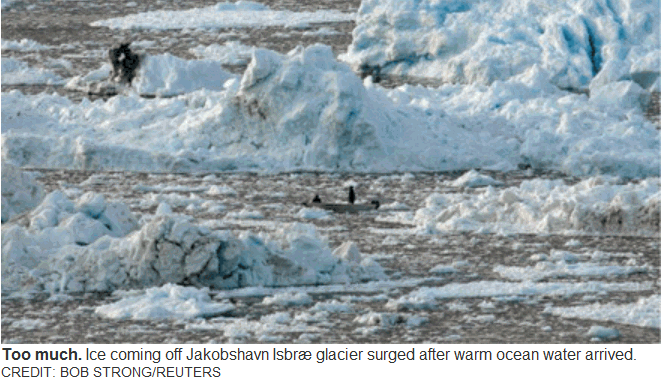|
|
|
|
|
|
|
News & Views item - October 2008 |
![]() Winds Implicated in Reduction of Greenland and Antarctic Ice Sheets.
(October 3, 2008)
Winds Implicated in Reduction of Greenland and Antarctic Ice Sheets.
(October 3, 2008)
Aside from the direct effect of global warming on the melting of Greenland's Jakobshavn Isbrę glacier and that of the West Antarctic ice sheet, two recent studies implicate random, wind-induced circulation changes in the ocean as being significant factors, and in the case of the Jakobshavn Isbrę glacier the dominate cause.
According to glaciologist Richard Alley of Pennsylvania State University: "you're going to have trouble blaming this on global warming." Nevertheless, in his view: "The really important thing is when you look at [climate] projections, you have warming around Greenland."

But as glaciologist Robert Bindschadler of NASA's Goddard Space Flight Center in Greenbelt, Maryland, told Science the results underscore the threat of global warming by showing how warmth can "hit ice sheets where it hurts."
In both the cases of the Greenland Glacier and that of the West Antarctic "the atmosphere over the glaciers didn't seem to have warmed enough to trigger the degree of the observed melting, and meltwater was judged not to contribute sufficient lubrication for glacial flow to explain the losses.
Previously, fisheries researchers had recorded bottom temperatures off southwest Greenland while surveying shrimp populations from 1991 to 2006 and physical oceanographer David Holland of New York University and his colleagues after analysing those data reported online this week in Nature Geoscience that "an influx of warmer, saltier water in 1997 'coincided precisely' with the rapid thinning and subsequent acceleration of Jakobshavn Isbrę glacier, Greenland's most prolific outlet for ice".
The influx of that ocean warmth has been traced back to the atmosphere over the North Atlantic. "An abrupt weakening of winds due to a natural atmospheric phenomenon called the North Atlantic Oscillation drove more waters from the Irminger Sea near Iceland around the tip of Greenland, up onto the shelf, and under the ice."
Other data with regard to the West Antarctic ice shelf suggest that similar circumstances may be responsible for its increased melting. Adrian Jenkins of the British Antarctic Survey in Cambridge, U.K. cautioned: "whether we're going to see a continuation of [those losses] is not clear."